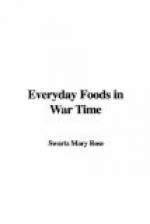But what significance has the “Anti-Scorbutic Property”? Does that not make potatoes indispensable? Scurvy, Madam, occurs whenever people live for a long time on a monotonous diet without fresh food. The potato offers good protection against this disease at a low cost, but other foods have long been known to possess the same power, among them oranges, lemons, limes, and other fruits, and cabbage and other green vegetables; in fact, a mixed diet in which fruits and vegetables occur is assurance of freedom from scurvy. Just how far the potato will go in providing the specific vitamines essential for growth is still unsettled. It undoubtedly contains one of them in goodly amount, but for the present it is wise to include some green (leaf) vegetable in the diet even when potatoes are plentiful, especially if butter, milk, and eggs cannot be freely used.
Nutritionally then, we can find substitutes for the potato; practically, too, we can find quite satisfactory alternatives for it in our conventional bills of fare. On the face of things the potato is a bland mealy food which blends well with the high flavor and the firm texture of meat and the softness of many other cooked vegetables. Gastronomically, rice or hominy comes about as near to having the same qualities, with hot bread, macaroni, sweet potatoes, and baked bananas (underripe so as not to be too juicy and sweet) close rivals. These are not so easy to cook and serve as the potato and are not likely to supplant it when it is plentiful. It might be worth while, however, to substitute these for potatoes rather often. The latter will be appreciated all the more if not served every day in the week, or at least not more than once a day. We might extend the fashion of baked beans and brown bread to roast pork with rice, ham with baked bananas, roast beef with hominy, and broiled steak with macaroni. Why not? You, Madam Housewife, are always sighing for variety, but does it never occur to you that the greatest secret of variety lies in new combinations?
CHAPTER V
ARE FRUITS AND VEGETABLES LUXURIES?
In the house of diet fruits and vegetables may be likened to windows and doors, fire-places and chimneys; we could dispense with them, we could board up our windows and make a fire on a big stone in the middle of the room, letting the smoke escape through a hole in the roof, but such a course would not mean comfort year in and year out. So we may exist without fruits and vegetables, but it is worth while to stop and consider what we gain by their use.
We shall have to admit at the outset that if we have to spend money or labor for them, fruits and vegetables are not the cheapest source of fuel for the human machine. Some of them are cheaper fuel than butter, eggs, or meat, but not as cheap as cereals, sugar, molasses, syrups, and some of our cheapest fats. This is true of potatoes, parsnips, carrots, dried peas and beans, and such fruits as bananas, prunes, raisins, dates, figs, and possibly a few other dried fruits, but we cannot justify our investment in most fruits and vegetables solely on the plea that they are “filling” in the sense of being of high fuel value; on this ground lettuce, celery, cabbage, tomatoes, lemons, rhubarb, cranberries, and many others would find no place in our domestic economy.




